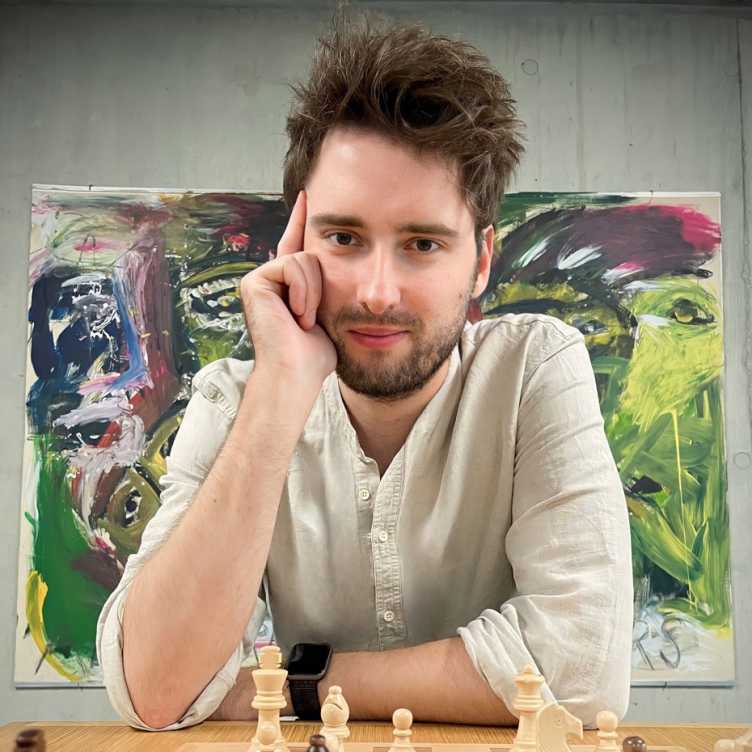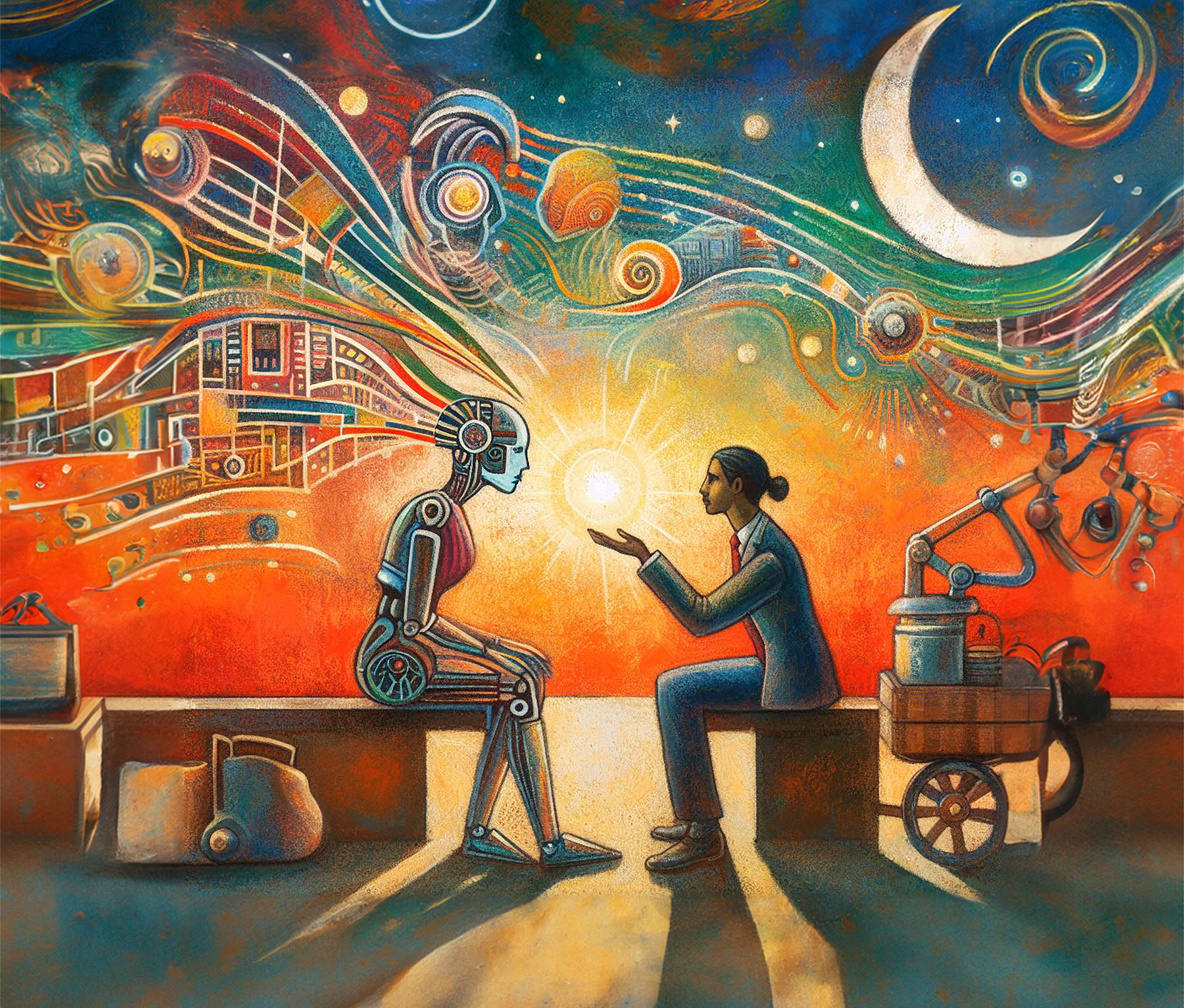“ChatGPT may not be the greatest poet and thinker of our time, but it is an increasingly important source of inspiration”

Johannes Dahlke, Assistant Professor of Digital Innovation and Entrepreneurship at the University of Twente, KOF Research Fellow and former member of the Innovation Economics Section, talks in this interview about the potential of artificial intelligence and explains how technological change will affect the labour market and individual professions.
Artificial intelligence (AI) has been around for a long time – at least as a concept. Why has this technology only now achieved a breakthrough with applications such as ChatGPT and Midjourney?
Various factors have come together in recent years. The data used to train programs such as ChatGPT is now available on a massive scale. Added to this is the availability of huge amounts of computing power. And, finally, advances in research into neural networks and language models, on which ChatGPT and other AI applications are based, have made an important contribution to the current AI boom. This means that we are now observing very diverse forms of artificial intelligence in various areas. Above all, however, the latest language models provide fundamental platforms on which third parties can produce a variety of specific applications. This greatly accelerates the spread of AI utilisation.
“It is up to us to realise how we can meaningfully enrich jobs using AI instead of sacrificing them for short-term efficiency gains.”Johannes Dahlke, KOF Research Fellow
How will technological progress affect the labour market? Are some people’s fears of losing their jobs justified?
It always depends on what sort of tasks are involved in a job and how these tasks can be replaced or changed by artificial intelligence. Ideally, artificial intelligence and robots will perform boring, dirty, tedious and strenuous tasks so that humans have more time for cognitively higher-value jobs. In academic research we use the term ‘augmentation’ to describe this, meaning an expansion or enrichment of the job profile. Presumably there will be job losses in professions that require intermediate cognitive skills.
Can you give specific examples of this?
I’m thinking of copywriters, administrative staff, graphic designers and composers of simple, non-artistic music that is suitable for the masses. Professions that require extensive systemic knowledge – i.e. where many things have to be linked, such as scientists and doctors – will continue to exist. However, doctors, for example, will be supported by AI technology in the diagnosis and treatment of diseases, so they will ideally have more time to look after patients and very complex clinical cases. Jobs in education and social care as well as professions that require manual skills are also unlikely to be replaced by AI any time soon. It has to be said, however, that such predictions quickly become outdated owing to the current rapid pace of technological progress.
What do we as a society do with people who lose their jobs as a result of AI? After all, you can’t retrain every bus driver to become a software engineer.
Firstly, we should see jobs as a spectrum of tasks, not all of which can usually be performed by AI. The bus driver not only drives the vehicle but is also responsible, for example, for complying with domiciliary rights and ensuring the safety of passengers. There will therefore initially be many changes here but not necessarily any immediate replacement of these jobs. Nevertheless, this may reduce the need for human labour and thus create job losses in those professions in which the key value-creating task is performed by AI. Attempts should be made here to assist the losers of AI through social policy and retraining. The bus driver does not necessarily have to become a software engineer, and he or she may be able to work well with people in areas such as social care or education. It is important that the profits from AI do not just go to the few. If the bargaining power of AI losers decreases because their skills are no longer needed, this must be offset by social policy measures. In addition, the range of activities that can be developed through cooperation between humans and machines is greater than that of humans or machines alone. It is up to us to realise how we can meaningfully enrich jobs using AI instead of sacrificing them for short-term efficiency gains.
How does our education and training system need to change? Do we still need to teach reading, writing and maths in schools and impart a traditional canon of knowledge, or should pupils learn programming in primary school instead?
Programming alone is not the solution. AI-supported language models can now program very well. In my view it is more important to teach critical thinking. The written word is not just a means of communication: the process of writing also teaches us to think because you put arguments on paper and enter into a discourse with yourself and others. Studying maths also trains us to think. We should see these skills as a learning process rather than as problem-solving tools. That’s why we don’t just have to focus on performance but encourage the creative use of technical aids and group work as well. Ultimately, we also need to become better at developing a thorough understanding of how technology can be integrated into our society.
Is the spread of artificial intelligence a technological revolution comparable to the invention of the steam engine or electricity?
The comparison can be made, even if it is still too early to draw a final conclusion. Like the steam engine and electricity, AI promises to become a ‘general purpose technology’ that will change virtually all sectors of industry and services. Unlike the industrial revolution of the 18th and 19th centuries, however, this time it is not just manual processes that are being replaced by technology, but primarily cognitive processes. Even more so than the huge technological advances achieved at that time, AI harbours the potential to unleash more innovation and change.
In which areas are humans still superior to AI?
Artificial intelligence has historically often had a narrow field of application, even if it is currently expanding thanks to programs such as ChatGPT. These programs have long since achieved superhuman capabilities in processes involving calculation, prediction, optimisation and pattern recognition. However, the abilities of a human being – at least as far as the current state of knowledge and technology is concerned – are even broader. Humans have the capacity for empathy, emotions and social contextualisation, which are extremely important when dealing with other people. ChatGPT may not be the greatest poet and thinker of our time, but it is an increasingly important source of inspiration – at least as long as the reality of our lives is created by people in social contexts. In my view, it is more likely that artists and machines will inspire each other in the future.
“We often think in terms of one overpowering AI. In reality, however, there are a multitude of different AI programs that each have their own strengths and weaknesses and do not always agree with each other.”Johannes Dahlke, KOF Research Fellow
You are researching the use of AI in chess and have received an award for your work in the United States. What is the essay about?
In the essay I looked at chess grandmasters, a professional group that performs very high-quality cognitive work and has been working closely with various versions of AI for 20 years. The AI usage rate in this group is 100 per cent. Although chess professionals are not allowed to use AI in competitions, they use AI intensively in their training and preparations. Creative processes and idea generation play a key role here. The study therefore gives us an insight into how AI will change other knowledge-intensive jobs in the future. It must be said, however, that the field of chess grandmasters is a niche profession and has a number of peculiarities.
What are the most important findings of the study?
You can see that a technology that is technically superior to humans in the narrow sense – because the AI reliably wins against human opponents – does not necessarily mean that humans will become useless and the profession of chess player will die out. Rather, chess grandmasters have specialised in guiding AI and interpreting its ideas as well as mediating between different versions of AI. We often think in terms of one overpowering AI. In reality, however, there are a multitude of different AI programs that each have their own strengths and weaknesses and do not always agree with each other. This is where the human decision-maker becomes the arbiter. In order to make the right decision, the application context must be studied and human experience brought to bear. For example, it is necessary to anticipate how other competitors will use the technology in order to adapt the use of AI accordingly. On the other hand, the institutional framework prohibiting the use of AI in competition also plays a decisive role. People want to preserve the game of chess and are therefore making this normative decision. We will often be faced with similar decisions as a society in the coming years.
How does Europe rank globally when it comes to artificial intelligence?
Overall, Europe is struggling to compete with the US and China in terms of technology. Large corporations such as Apple, Microsoft, Alphabet, Baidu and Tencent continue to set the tone when it comes to the digital economy. Profits and progress are accumulating where they have already been made in the past. This makes it difficult for competitors to catch up.
And how is Switzerland positioned?
There is no reason to talk Switzerland down when it comes to AI. According to the latest KOF Innovation Survey, almost 10 per cent of Swiss firms with more than five employees use artificial intelligence. Among large companies this proportion was as high as 30 per cent in 2020. This puts Switzerland at a similarly advanced stage as – or perhaps even a little further than – comparable industrialised nations. Switzerland has a well-developed start-up culture, for example in the tech cluster in Zug. The transfer of knowledge between universities and businesses also works well. It is no coincidence that Google, Facebook and Microsoft have offices in the greater Zurich area. We are currently seeing the Swiss start-up AlpineAI (also a product of the fruitful collaboration between universities and the private sector) launching its own language model on the market in the form of SwissGPT. This could be interesting for the European market with its particular regulatory framework.
A short version of the study entitled ‘Across the Board: AI in Chess Increases Occupational Complexity and Salience of Holistic Identities’ is available here: external page https://doi.org/10.5465/AMPROC.2023.29bp
Contacts
Universität Twente
KOF Bereich Zentrale Dienste
Leonhardstrasse 21
8092
Zürich
Switzerland
